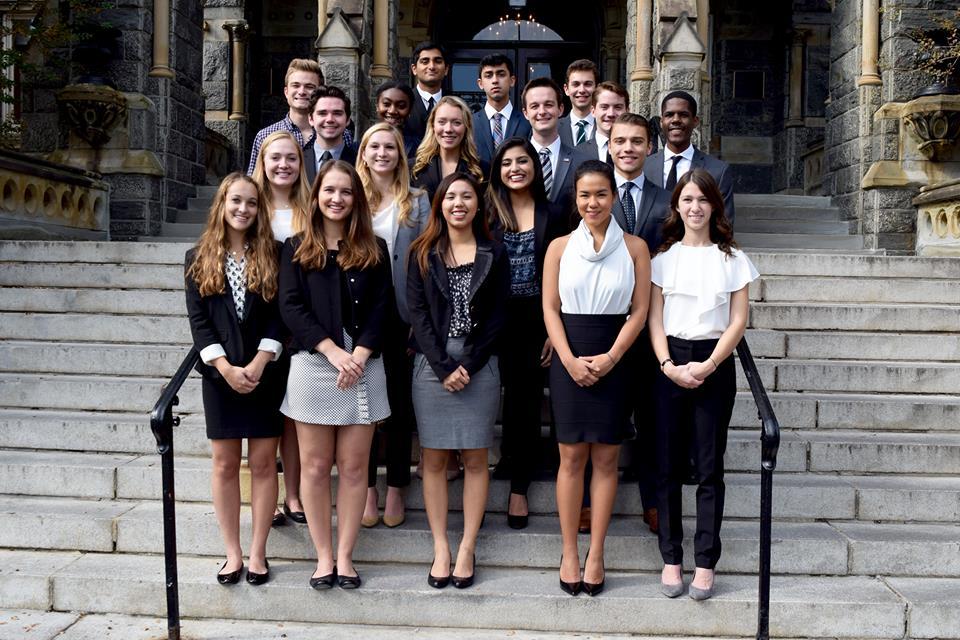
The GUSA Federal Relations Team is working to improve outreach efforts and goals it set when it first launched in early April following the GUSA executive elections.
Shortly after the election of Georgetown University Student Association President Enushe Khan (MSB ’17) and Vice President Chris Fisk (COL ’17) to the executive, Federal and D.C. Relations Committee Director Kotryna Jukneviciute saw an opportunity to fill a hole in GUSA’s advocacy efforts.
“I always had that notion that there was more to be done, because for me, the real issues are outside of Georgetown,” Jukneviciute said. “That’s where the real problems are that need to be addressed.”
She convened the group through consultation with Khan and Fisk to serve as a liaison between the federal government, the local government and Georgetown.
In its seven months of operation, the 20-person committee has worked to improve outreach efforts and accomplish goals it set in early April when the new GUSA executive leadership announced its formation.
The team identified several policy goals last semester, including advocating for the Higher Education Reauthorization Act, a mentoring program with public schools in the District, advocacy for D.C. statehood, a network to organize college student activism across the country and a partnership with D.C. Central Kitchen to provide summer storage space.
To address national advocacy efforts from various college campuses, the team’s Secretary of Institutional Outreach Zachary Schroepfer (MSB ’19) worked to organize a Student Leadership Alliance. The coalition of students from different schools seeks to organize activism on Capitol Hill regarding student life.
“What I specifically have done is reaching out to universities from every state and inviting them to become a part of the SLA. Up to this date we’ve gotten a little more than 40 universities to join,” Schroepfer said. “We have petitions that are student-generated, so students write one-page petitions that typically support specific pieces of federal policies. After that the petitions go on our website, and we begin national campaigns.”
So far, the SLA has conducted a national campaign for a sexual assault policy reform petition, according to Schroepfer.
“This petition supports the Campus Accountability and Safety Act Bill. This act is seen as the most comprehensive sexual assault bill that is currently on the docket of Congress,” Schroepfer said. “We were able to acquire over 200 signatures, which may not seem like very many for a national petition, but we were at a smaller size than we currently are.”
Since Congress is on recess until Nov. 14 the SLA eventually plans to take these petitions to Capitol Hill and meet with congressional staffers. In the meantime, the network does not plan immediate action.
On the education front, the team’s Secretary of Local Educational Affairs Kamar Mack (COL ’19) lobbies with the D.C. Public School system, the D.C. City Council and the mayor’s office about local educational policy.
Mack said he is looking to advocate for more civic education to be taught in D.C. public schools.
“The project I’m working on this semester is a civic education bill, and essentially we are proposing legislation to incorporate more civic education into the D.C. public school curriculum,” Mack said.
Not all of the team’s education efforts this semester have been successful. The Hoya reported efforts to create a mentorship program with D.C. elementary schools on April 26. The team will no longer pursue this since it is a redundant effort the Center of Social Justice is already pursuing, according to Mack.
The team’s other initiatives include lobbying to maintain the federal government’s Pell Grant funding and organizing on-campus events to spread mental health awareness.
The committee receives $400 dollars in funding from GUSA, even though some students may believe otherwise, according to Jukneviciute..
“GUSA has very, very limited finances, and I think there’s a misconception where students think that GUSA has money. Even buying pizza becomes a battle,” Jukneviciute said.
Jukneviciute said her team is working to improve perceptions of the team.
“Ultimately, you can understand your campus,” she said. “If you’re one of those people who is involved, is very social on campus and has a good feeling for the student body in general, you should be able to understand the feeling of your campus.”
Former GUSA Vice President Connor Rohan (COL ’16) said GUSA’s youngest initiative is promising.
“Any organization is worthwhile if it’s comprised of students willing to donate countless hours to improving our community, and those who are quick to criticize but reluctant to contribute display a contemptuous ignorance that too many Hoyas consider a virtue,” Rohan said.
Correction: This article previously stated the committee is named the D.C. and Federal Relations Relations Committee; the committee is named the Federal and D.C. Relations Committee.
This article has been updated.




















